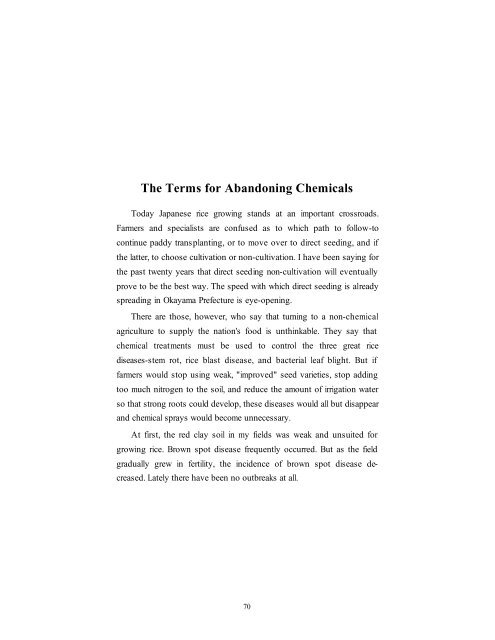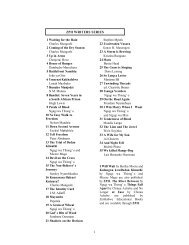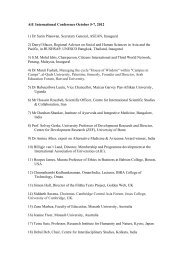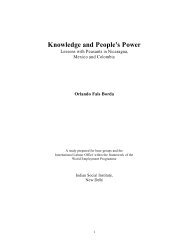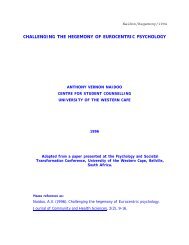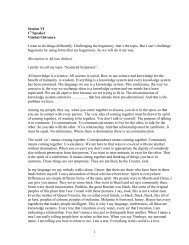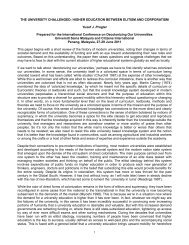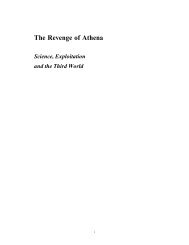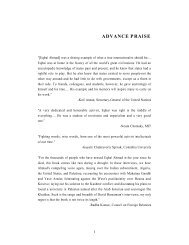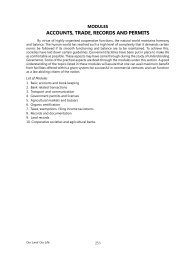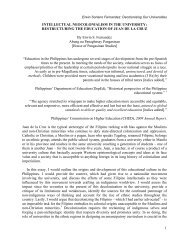- Page 1:
Extraido de ZEMOS98http://www.zemos
- Page 4 and 5:
The One-Straw Revolutionby Masanobu
- Page 6 and 7:
A Merciful Death for Barley ……
- Page 8 and 9:
viii
- Page 10 and 11:
Fortunately for us our printer frie
- Page 12 and 13:
maximum per acre yields. But the ba
- Page 14 and 15:
squashes and other vegetable by dib
- Page 16 and 17:
all needed resources to grow plants
- Page 18 and 19:
Invariably our peasant visitors wer
- Page 20 and 21:
We would broadcast clover seed in a
- Page 22 and 23:
stayed long enough at his farm to l
- Page 24 and 25:
knack for appearing at times when t
- Page 26 and 27:
are distributed over the field, whi
- Page 28 and 29:
This yield is approximately the sam
- Page 30 and 31:
ooks and magazines, and was intervi
- Page 32 and 33:
hole in the soil with a stick or a
- Page 34 and 35:
The Japanese, mikan, is translated
- Page 36 and 37:
xxxvi
- Page 38 and 39:
xxxviii
- Page 43 and 44:
Look at this GrainI believe that a
- Page 45 and 46:
In early November, the rice is harv
- Page 47 and 48:
Since what I was thinking was a den
- Page 49 and 50:
movie star!" Right away, I sent ten
- Page 51 and 52:
and sparkling. I felt that this was
- Page 53 and 54:
Returning to the CountryOn the day
- Page 55 and 56:
whatsoever. I could only think of t
- Page 57 and 58:
Toward a Do-Nothing FarmingFor thir
- Page 59 and 60:
form, pruning and insect exterminat
- Page 61 and 62: Returning to the SourceLeaning agai
- Page 63 and 64: from nature, they spin out further
- Page 65 and 66: the sprayed fields. Then it dawned
- Page 67 and 68: Humanity Does Not Know NatureLately
- Page 69 and 70: It is impossible for specialized re
- Page 71: as it sometimes does, you might not
- Page 76 and 77: that the plow is essential for grow
- Page 78 and 79: the first place. The farmer also ha
- Page 80 and 81: Using straw, green manure, and a li
- Page 82 and 83: of their "remedy" If the situation
- Page 84 and 85: and rye can be successfully grown w
- Page 86 and 87: First the unhulled rice seed is soa
- Page 88 and 89: or lupine might prove a more suitab
- Page 90 and 91: next year and reported that the tes
- Page 92 and 93: Threshing the crop with the traditi
- Page 94 and 95: Straw Helps to Copewith Weeds and S
- Page 96 and 97: Rice plants grown in a dry field do
- Page 98 and 99: should and that it has the ideal sh
- Page 100 and 101: Orchard TreesI also grow several va
- Page 102 and 103: that, the problem will generally ta
- Page 104 and 105: 90 pounds and more was a big job, b
- Page 106 and 107: cutting back the weeds [During the
- Page 108 and 109: animal manure and human waste, thin
- Page 110 and 111: Chinese leeks, once planted, will c
- Page 114 and 115: hundred plants, ten or twenty perce
- Page 116 and 117: Limits of the Scientific MethodBefo
- Page 118: You hear a lot of talk these days a
- Page 122 and 123: eaching action could be decided upo
- Page 124 and 125: A Modest Solutionto a Difficult Pro
- Page 126 and 127: uilt as well. When solutions develo
- Page 128 and 129: ten to twenty times higher than sea
- Page 130 and 131: that is not fresh can be sold becau
- Page 132 and 133: At this point the question arises a
- Page 134 and 135: Commercial Agriculture Will FailWhe
- Page 136 and 137: trees. Furthermore, the white legho
- Page 138 and 139: Research for Whose Benefit?When I f
- Page 140 and 141: No matter how hard people try, they
- Page 142 and 143: them, the taste was completely diff
- Page 144 and 145: eyond compare. Even moths, if you s
- Page 146 and 147: Each person should ponder seriously
- Page 148 and 149: nationwide by the government's agri
- Page 150 and 151: production is again being advocated
- Page 152 and 153: Simply Serve Nature and All Is Well
- Page 154 and 155: making money, expanding, developing
- Page 156 and 157: there will be enough food to eat, i
- Page 158 and 159: If you look across the country you
- Page 160 and 161: West takes as its point of departur
- Page 162 and 163:
120
- Page 164 and 165:
122
- Page 166 and 167:
Japan originated with the teachings
- Page 168 and 169:
When I had gone this far, the youth
- Page 170 and 171:
Farming, fishing, animal raising, t
- Page 172 and 173:
When the bamboo sends up its young
- Page 174 and 175:
Millet cakes are enjoyed at the aut
- Page 176 and 177:
The Culture of FoodWhen asked why w
- Page 178 and 179:
food's flavor may vary, depending o
- Page 180 and 181:
The best methods of food preparatio
- Page 182 and 183:
One might suppose that Western diet
- Page 184 and 185:
Summing Up DietIn this world there
- Page 186 and 187:
and consciously sustained. But if t
- Page 188 and 189:
mind. I hoped that the food mandala
- Page 190 and 191:
148
- Page 192 and 193:
150
- Page 194 and 195:
There are no modern conveniences. S
- Page 196 and 197:
People think that when they turn th
- Page 198 and 199:
Who Is the Fool?It is said that the
- Page 200 and 201:
“If you did nothing at all the wo
- Page 202 and 203:
I Was Born to Go to Nursery SchoolA
- Page 204 and 205:
that this rice, because it possesse
- Page 206 and 207:
Drifting Cloudsand the Illusion of
- Page 208 and 209:
active world of elementary particle
- Page 210 and 211:
structure is broken down, earthworm
- Page 212 and 213:
That night as we were finishing the
- Page 214 and 215:
A Village Without War and PeaceA sn
- Page 216 and 217:
“In nature, the world of relativi
- Page 218 and 219:
the hated enemy. For humans, the fi
- Page 220 and 221:
The One-Straw RevolutionAmong the y
- Page 222 and 223:
farmers used to compost the straw c
- Page 224 and 225:
182


